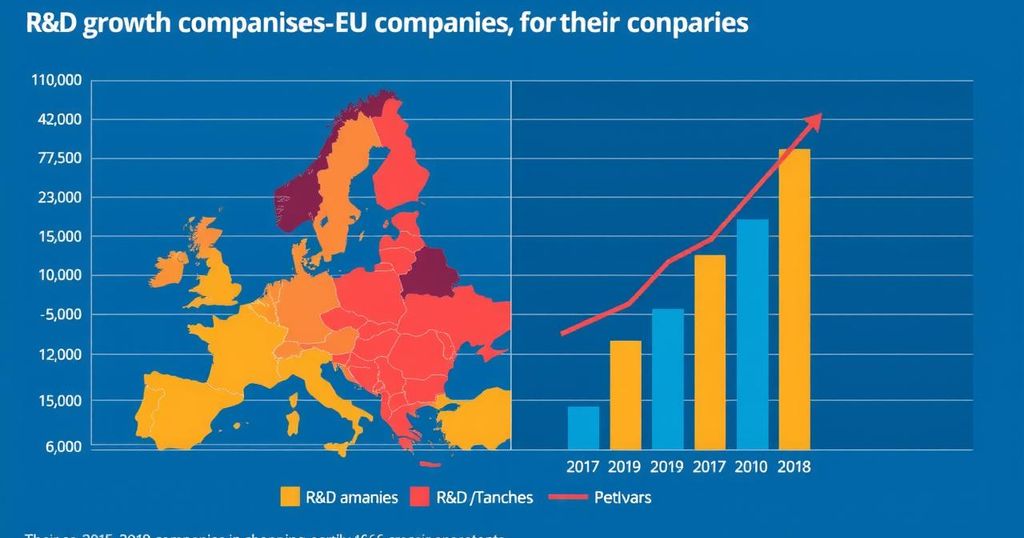The EU’s investment in R&D increased by 9.8% in 2023, surpassing both the US and China for the first time since 2013. Despite global R&D growth slowing to 7.8%, the top 2000 companies invested a record €1257.7 billion. The EU led in automotive R&D investments, claimed 18.7% of global private R&D, and emphasized the necessity for strengthened investments in critical sectors to further sustain economic competitiveness.
The latest edition of the EU Industrial R&D Investment Scoreboard reveals a remarkable growth in the European Union’s investment in research and development (R&D), which has risen by 9.8% in 2023. This marks a significant milestone as it surpasses the investment growth in the United States, which saw an increase of 5.9%, and China, at 9.6%. The EU’s private R&D investment now accounts for 18.7% of the global total, ranking second worldwide, behind the United States (42.3%). In contrast, China follows with 17.1%, Japan at 8.3%, and other global regions collectively accounting for 13.6%. Overall, the top 2000 companies worldwide invested a record €1257.7 billion in R&D, with the top 50 companies—11 of which are from the EU—making up 40.1% of this total.
Research and innovation are positioned as key drivers of the EU economy moving forward, catering to the demands of a sustainable digital economy and enhancing the EU’s global competitiveness. Nonetheless, the Scoreboard underscores the need for the EU to close the gap in innovation as compared to international competitors. It is essential for Europe to bolster private R&D investments, support vital sectors including Information and Communication Technologies (ICT) and health, address variances among Member States, and facilitate the growth of EU-based enterprises.
The automotive sector remains a stronghold for the EU, positioning it as a leader in global R&D investment within this field. EU-based companies contributed 45.4% of the automotive sector’s global R&D in 2023, outperforming counterparts from the United States and Japan, as well as exceeding investment levels from China by over threefold. While the EU has a notable presence in automotive R&D, its participation in ICT software remains limited, with US companies accounting for a staggering 70% of the sector’s global R&D investments.
Examining the EU landscape reveals that among the top 800 companies based in the EU, R&D investments reached €247.7 billion in 2023, a growth of 8.7% compared to the previous year. Leading this investment trend is the automotive sector, which alone accounts for 34.2% of corporate R&D investments, followed closely by health at 19.3%. Additionally, there is considerable growth potential in smaller biotech and semiconductor firms, with some companies witnessing R&D investments surge by two to fifty times over the last decade.
The distribution of R&D investment is uneven, particularly for lower-performing research and innovation regions, referred to as widening countries. In 2023, only four companies from these widening countries ranked in the global top 2000 R&D investors. Nevertheless, the presence of subsidiaries from internationally recognized innovators within these countries is significant, especially in Czechia and Poland, who constitute a notable percentage of the total.
The EU Industrial R&D Investment Scoreboard has been published annually since 2004, providing vital economic insights based on the latest financial data from the top 2000 R&D investors globally, as well as the top 800 companies within the EU. The Scoreboard serves as a significant resource for analysis in science, industry, and policymaking, having informed numerous key reports over two decades, including insights on European competitiveness. Its data is readily accessible to the public, promoting transparency in R&D activities across the continent.
In conclusion, the 2024 EU Industrial R&D Investment Scoreboard highlights a significant rebound in the EU’s investment in R&D compared to other global economic powerhouses. With a notable increase in investment, particularly in sectors such as automotive and health, the EU demonstrates firm growth potential despite ongoing challenges in innovation. The findings advocate for a concentrated effort in enhancing private research and innovation across Member States to sustain competitiveness and foster future growth.
Original Source: ec.europa.eu

Leave a Reply